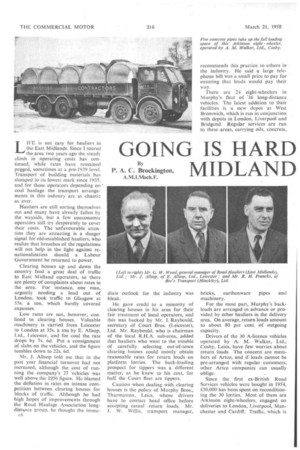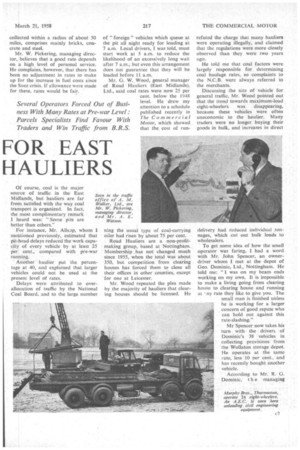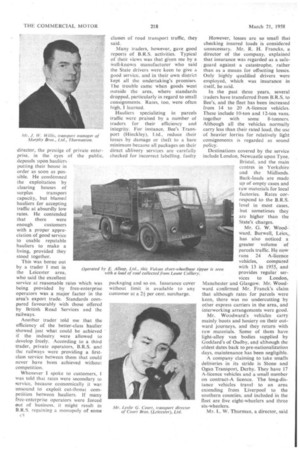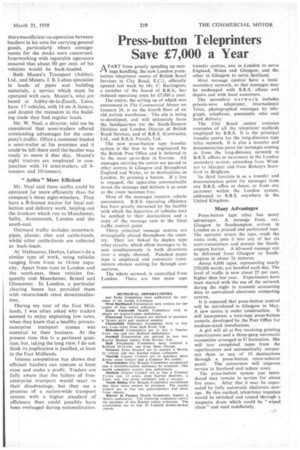GOING IS HARD MIDLAND
Page 42

Page 43

Page 44

Page 45

If you've noticed an error in this article please click here to report it so we can fix it.
By
P. A. C. Brockington,
A.M.I.Mech.E. LIFE is not easy for hauliers in the East Midlands. Since I toured the area two years ago the steady climb in operating costs has continued, while rates have remained pegged, sometimes at a pre-1939 level. Transport of building materials has slumped to its lowest mark since 1935, and for those operators -depending on ' coal haulage the transport arrangements in this industry are as chaotic
as ever. _ Hauliers are still sorting themselves out and many have already 'fallen by the wayside, but a few uneconomic operators still try desperately to cover their costs. The unfavourable attention they are attracting is a danger signal for old-established hauliers, who realize that breaches of the regulations will not help in the fight against renationalization should a Labour Government be returned to power.
Clearing houses up and down the country feed a great deal of traffic to East Midland operators, so there are plenty of complaints about rates in the area. For instance, one man, urgently needing a load out of London, took traffic to Glasgow at 55s. a ton, which hardly covered expenses.
Low rates are not, however, confined to clearing houses. Valuable machinery is carried from Leicester to London at 35s, a ton by E. Al'sop, Ltd., Leicester, and for coal the rate drops by 7s. 6d. Put a consignment of slabs on the vehicles, and the figure tumbles down to 22s. 6d.
Mr. J. Allsop told me that in the past year financial turnover had not increased, although the cost of running the company's 27 vehicles was well above the W56 figure. He blamed the deflation in rates on intense competition between clearing houses for blocks of traffic. Although he had high hopes of improvements through the Road Haulage Association long'clistance group. he thought the imme c6 diate outlook for the industry was bleak.
He gave credit to a minority of clearing houses in his area for their fair treatment of local operators, and this was backed by Mr. I. Raybould, secretary of Court Bros. (Leicester), Ltd. Mr. Raybould, who is chairman of the local R.H.A. sub-area, added that hauliers who went to the trouble of carefully selecting out-of-town clearing houses could mostly obtain reasonable rates for return loads on platform lorries. The back-loading prospect for tippers was a different matter, as he knew to his cost, for half the Court fleet are tippers.
. Caution when dealing with clearing houses is the policy of Murphy Bros., Thurmaston, Leics, whose drivers have to contact head office before accepting casual return loads. Mr. J. W. Willis, transport manager,
recommends this practice to others in the industry. He said a large telephone bill was a small price to pay for ensuring that loads would pay their way.
There are 24 eight-wheelers in Murphy's fleet of '36 long-distance vehicles. The latest addition to their facilities is a new depot at West Bromwich, which is run in conjunction with depots in London, Liverpool and Bridgend. Regular services are run to these areas, carrying oils, concrete, bricks, earthenware pipes and machinery.
For the most part, Murphy's backloads are arranged in advance or provided by other hauliers in the delivery area. On average, return loads amount to about 80 per cent. of outgoing capacity.
Drivers of the 30 A-licence vehicles operated by A. M. Walker, Ltd., Cosby, Leics, have few worries about return loads. The concern are members of Artco, and if loads cannot be pre-arranged with regular customers, other Artco companies can usually oblige.
Since the first ex-British Road Services vehicles were bought in 1954, £30,000 has been spent on reconditioning the 30 lorries. Most of them are Atkinson eight-wheelers, engaged on deliveries to London, Liverpool, Manchester and Cardiff. Traffic, which is collected within a radius of about 50 miles, comprises mainly bricks, concrete and steel.
Mr. W. Pickering, managing director, believes that a good rate depends on a high level of personal service. He complains, however, that there has been no adjustment in rates to make up for the increase in fuel costs since the Suez crisis. If allowance were made for these, rates would be fair.
Of course, coal is the major source of traffic in the East Midlands, but hauliers are far from satisfied with the way coal transport is organized. In fact, the most complimentary remark I heard was: "Some pits are better than others."
For instance, Mr. Allsop, whom I mentioned previously, estimated that pit-head delays reduced the work capacity of every vehicle by at least 25 per cent., compared with pre-war running.
Another haulier put the percentage at 40, and explained that larger vehicles could not be used at the present level of rates.
Delays were attributed to overallocation of tFaffic by the National Coal Board, and to the large number of " foreign " vehicles which queue at the pit all night ready for loading at 7 a.m. Local drivers, I was told, must start work at 5 a.m. to reduce the likelihood of an excessively long wait after 7 a.m.; but even this arrangement does not guarantee that they will be Loaded before 11 a.m.
Mr. G. W. Wood, general manager of Road Hauliers (East Midlands), Ltd., said coal rates were now 25 per cent. below the 1948 level. He drew my attention to a schedule published recently in The Commercial Motor, which showed that the cost of rim
ning the usual type of coal-carrying oiler had risen by about 75 per cent.
Road Hauliers are a non-profit making group, based at Nottingham. Membership has not changed much since 1955, when the total was about 350, but competition from clearing houses has forced them to close all their offices in other counties, except for one at Leicester.
Mr. Wood repeated the plea made by the majority of hauliers that clearing houses should be licensed. He refuted the charge that many hauliers were operating illegally, and claimed that the regulations were more closely observed than they were two years ago.
He told roe that coal factors were largely responsible for determining coal haulage rates, so complaints to the N.C.B. were always referred to the merchants.
Discussing the size of vehicle for general traffic, Mr. Wood pointed out that the trend towards maximum-load eight-wheelers was disappearing, because these vehicles were often uneconomic to the haulier. Many traders were no longer buying their goods in bulk, and increases in direct delivery had reduced individual ionnages, which cut out bulk loads to wholesalers.
To get some idea of how the small operator was faring, I had a• word with Mr. John Spencer, an ownerdriver whom I met at the depot of Geo. Dominic, Ltd., Nottingham. He told me: I was on my beam ends working on my own. It is impossible to make a hying going from clearing house to clearing house and running at -.ny rate they like to give you. The small man is finished unless he is working for a larger concern of good repute who can hold out against this rate-slashing."
Mr Spencer now takes his turn with the drivers of Dominic's 38 vehicles in collecting provisions from the Wollaton storage depot. He operates at the same rate, less -10 per cent., and has recently bought another vehicle.
According to Mr. R. G. Dominic, I h e managing director, the prestige of private enterprise, in the eyes of the public. depends upon hauliers putting their house in order as soon as possible. He condemned the exploitation by clearing houses of surplus transport capacity, but blamed hauliers for accepting traffic at absurdly low rates. He contended that there were enough customers with a proper appreciation of good service to enable reputable hauliers to make a living, provided they stood together.
This was borne out by a trader I met in the Leicester area, who said the excellent service at reasonable rates which was being provided by free-enterprise operators was a major factor in the area's export trade. Standards compared favourably with those offered by British Road Services and the railways.
Another trader told me that the efficiency of the better-class haulier showed just what could be achieved if the industry were allowed to develop freely. According to a third trader, private operators, B.R.S. and the railways were providing a firstclass service between them that could never have been achieved without competition.
Whenever I spoke to customers, was told that rates were secondary to service, because economically it was unsound to exploit cut-throat competition between hauliers. If many free-enterprise operators were forced out of business, it might result in B.R.S. regaining a monopoly of some classes of road transport traffic, they said.
Many traders, however, gave good reports of B.R.S. activities. Typical of their views was that given me by a Well-known manufacturer who said the State drivers were keen to give a good service, and in their own district kept all the undertaking's promises. The trouble came when goods went outside the area, where standards dropped, particularly in regard to small consignments. Rates, too, were often high, I learned.
I4auliers specializing in parcels traffic were praised by a number of traders for their efficiency and integrity. For instance, Bee's Transport (Hinckley), Ltd., reduce their losses by damage or theft to a bare minimum because all packages on their direct oblivery services are carefully checked for incorrect labelling, faulty packaging and so on. Insurance cover without limit is available to any customer at a 2-4 per cent. surcharge. However, losses are so small that checking insured loads is considered unnecessary. Mr. R. 14. Francks, a director of the company, explained that insurance was regarded as a safeguard against a catastrophe, rather than as a means for offsetting losses. Only highly qualified drivers were employed, which was insurance in itself, he said.
In the past three years, several traders have transferred from B.R.S. in Bee's, and the fleet has been increased from 14 to 20 A-licence vehicles. These include 10-ton and 12-ton vans, together with some 8-tonners. Although all the vehicles normally carry less than their rated load, the use of heavier lorries for relatively light consignments is regarded as sound policy.
Destinations covered by the service include London, Newcastle upon Tyne, Bristol, and the main centres in Yorkshire and the Midlands. Back-loads are made up of empty cases and raw materials for local factories. Rates correspond to the B,R.S. level in most cases, but sometimes they are higher than the State's charges.
Mr. G. W. Woodward, Burwell, Leics,, has also noticed a greater volume of parcels traffic. He now runs 24 A-licence vehicles, compared with 13 in 1955, and provides regular services to London, Manchester and Glasgow. Mr. Woodward confirmed Mr. Franck's claim that although rates for parcels were keen, there was no undercutting by other express carriers in the area, and interworking arrangements were good.
Mr. Wood.ward's vehicles carry mainly boots and hosiery on their outward journeys, and they return with raw materials. Some of them have light-alloy van bodies supplied by Goddard's of Oadby, and although the oldest dates back to pre-nationalization days, maintenance has been negligible.
A company claiming to take smalls deliveries in its stride is Stone and Ogan Transport, Derby. They have 17 A-licence vehicles and a small number on contract-A licence. The long-distance vehicles travel to an area extending from Liverpool to the southern counties, and included in the fleet are five eight-wheelers and three six-wheelers.
Mr. L. W. Thurman, a director, said therewas efficient co-operation between hauliers in his area for carrying general goods, particularly where consignments for the docks were concerned. Interworking with reputable operators ensured that about 90 per cent. of his vehicles would be back-loaded.
Both Moore's Transport (Ashby), Ltd., and Messrs. J. B. Laban specialize in loads of pipes and building materials, a service which must he operated with care. Moore's, who are based at Ashby-de-la-Zouch, Leics, have 17 vehicles, with 14 on A licence, and despite the recession in the building trade they find regular loads.
Mr. W. Neal, a director, told me he considered that semi-trailers offered outstanding advantages for the company's traffic. Often a customer loaded a semi-trailer at his premises and it could be left there until the haulier was ready to move it that day. Moore's eight tractors are employed in conjunction with 14 semi-trailers, all 8tonners and 10-tonners.
" Artics " More Efficient
Mr. Neal said these outfits could be operated far more efficiently than the company's three eight-wheelers. They have a B-licence tractor for local collection and delivery work, heiping out the trunkers which run to Manchester, Selby, Avonmouth, London and the south-east.
Outward traffic includes stoneware, pipes, plaster, tiles and cattle-foods, whilst other cattle-foods are collected as back-loads.
At Melbourne, Derbys, Laban's do a similar type of work, using vehicles ranging from 6-ton to 16-ton capacity. Apart from runs to London and the south-east, these vehicles frequently visit Manchester, Bristol and Gloucester. In London, a particular clearing house has provided them with return-loads since denationalization.
During my tour of the East Midlands, I was often asked why traders seemed to enjoy exploiting low rates, when they knew that a healthy privateenterprise transport system was essential to their business. At the present time this is a pertinent question, but, taking the long view, I do not think its implication is justified, at least in the East Midlands.
Intense competition has shown that efficient hauliers can operate at keen rates and make a profit. Traders are fully aware that the failure of freeenterprise transport would react to their disadvantage, but they see a promise of a nation-wide transport system with a higher standard of efficiency than could possibly have been envisaged during nationalization.








































































































